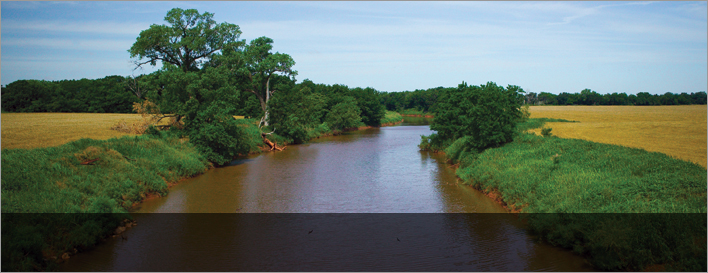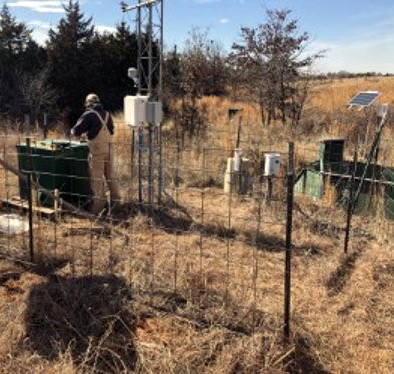Dr. Kevin Wagner


Dr. Kevin Wagner is the Project Director and Principal Investigator of the OK NSF EPSCoR Track-1 RII Award titled Socially Sustainable Solutions for Water, Carbon, and Infrastructure Resilience in Oklahoma. The $20 million research project is a social science-led, multi-disciplinary collaboration among social, physical, biological, engineering, and computational scientists. More than thirty researchers from across the state are working together on the project, which began July 1, 2020.
 In addition to serving as Project Director and PI, Dr. Wagner serves as the Team Lead of Focus Area 3: Variable and Marginal Quality Water Supplies (V-MQW); his research also supports Focus Area 2: Terrestrial Water & Carbon Dynamics (TWCD).
In addition to serving as Project Director and PI, Dr. Wagner serves as the Team Lead of Focus Area 3: Variable and Marginal Quality Water Supplies (V-MQW); his research also supports Focus Area 2: Terrestrial Water & Carbon Dynamics (TWCD).
Dr. Wagner's research addressing Focus Area 2: Terrestrial Water & Carbon Dynamics (TWCD) will aid in the team's goal of, "collecting and calibrating data to inform management decisions that will alter ecosystem productivity and carbon storage as well as water yield for agricultural, municipal, industrial, and ecological purposes." The TWCD focus area is central to the wicked problems facing Oklahoma because of conflicting policy narratives that shape concerns about carbon management and risks associated with landscape management practices (e.g., wildfire risks). At the same time, linkages across the TWCD and other focus areas provide opportunities to engage key stakeholder groups in discussions addressing both problem definition and potentially sustainable solution sets. Land use/carbon cycle issues play this crucial role because of the interactions among terrestrial ecosystems and carbon and water cycling, which are in turn integral components of the other impact domains addressed in this research project.
Focus Area 2 has a clear linkage with Focus Area 3: Variable and Marginal Quality Water Supplies (V-MQW), which Dr. Wagner leads. V-MQW addresses issues surrounding Oklahoma’s water demands, which are projected to increase 600,000 acre-feet per year between 2007-2060. Reliable water supplies are needed to provide for these demands while meeting the state’s goal of capping freshwater use to 2010 levels. However, freshwater supplies are declining due to reservoir sedimentation and groundwater overdraft and are increasingly vulnerable to S2S variability. Concurrently, volumes of oil and gas ‘produced water,’ municipal wastewater, and stormwater are increasing with continued oil and gas development and urbanization. Disposal of produced waters has been correlated with seismicity, potentially impacting infrastructure and resulting in energy production curtailment in some regions. The challenge is finding a mix of solutions that allow Oklahoma’s diverse array of MQW to be economically treated for beneficial use to address water scarcity related to changing seasonal to subseasonal weather patterns, waste disposal, and infrastructure risk while supporting continued energy production and economic growth.
In addition to his EPSCoR work, Dr. Wagner serves as director of the Oklahoma Water Resources Center, where his primary responsibilities include organizing interdisciplinary teams to further the knowledge of water resources in Oklahoma and connecting with agency personnel, stakeholders, and constituents. He also holds the Thomas E. Berry Professorship in Water Research and Management and is an associate professor in the Department of Plant and Soil Sciences at Oklahoma State University.
Dr. Wagner's Research Interests
- Watershed planning
- Watershed restoration
- Water use and efficiency
- Bacteria fate and transport
- Best management practice effectiveness
---------
Pictured above: Dr. Kevin Wagner installs sampling equipment at a research site
- Jeong, J., K. Wagner, J. Flores, T. Cawthon, Y. Her, H. Yen, J. Osorio. 2019. Linking Watershed Modeling and Bacterial Source Tracking to Better Assess E. coli Sources. Science of the Total Environment. 648:164-175.
- Gholson, D.M., D.E. Boellstorff, S. Cummings, K. Wagner and M. Dozier. 2018. Consumer Water Quality Evaluation of Private and Public Drinking Water Sources. Journal of Water and Health. 16(3):369-379.
- Gholson, D.M., D.E. Boellstorff, S.R. Cummings, K.L. Wagner, and M.C. Dozier. 2018. Outreach Preferences for Water Resource Information from Extension and other Sources. Natural Sciences Education. 47(1):1-7.
- Loy, S., J. Tahtouh, C. Munster, K. Wagner, A. Fares, S. Ale, R. Vierling, F. Jaber, and A. Jantania. 2017. State of the Art of Water for Food within the Nexus Framework. Current Sustainable/Renewable Energy Reports. 4(3):130-136.
- Gregory, L.F., R. Karthikeyan, J.A. Aitkenhead-Peterson, T.J. Gentry, K. Wagner, R.D. Harmel. 2017. Nutrient Loading Impacts on Culturable E. coli and other Heterotrophic Bacteria Fate in Simulated Stream Mesocosms. Water Research. 126:442-449.
- Wagner, K., L. Gregory, A. Berthold. 2016. Chapter 1 – Water Quality Management. In: D. Chen (ed.), Sustainable Water Management (Volume I), Taylor & Francis/CRC Press, Boca Raton, FL.
- Harmel, R., J. Hathway, K. Wagner, J. Wolfe, R. Karthikeyan, W. Francesconi, D. McCarthy. 2016. Uncertainty in Monitoring E. coli Concentrations in Streams and Stormwater Runoff. Journal of Hydrology. 534:524-533.
- Higgs, K., R.D. Harmel, K. Wagner, P. Smith, R. Haney, D. Smith, R. Pampell. 2015. Vegetated Treatment Area Effectiveness at Reducing Nutrient Runoff from Small Swine Operations in Central Texas. Applied Engineering in Agriculture. 31(4): 621-629.
- Gregory, L., B. Blumenthal, K. Borel, K. Wagner, and R. Karthikeyan. 2013. Estimating On-site Sewage Facility Density and Distribution using Geo-spatial Analyses. Journal of Natural & Environmental Sciences. 4(1): 14-21.
- Mukhtar, S., K. Wagner, L. Gregory. 2007. Technologies for Reducing Nutrients in Dairy Effluent. Texas AgriLife Extension Service Publication B-6196. College Station, TX: Texas A&M University.
